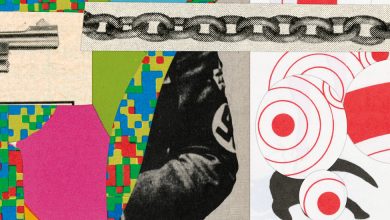Rappers Come Shop for Jewelry. Icebox Turns the Cameras On.

ATLANTA — The display cases at the Atlanta jewelry store Icebox teem with Cuban link chains, watches called bustdowns covered edge to edge in diamonds, gold pendants in dozens of designs. It is the ne plus ultra of contemporary hip-hop luxury. And over the last three years, Icebox has built a secondary business atop this phenomenon, starting a YouTube channel filled with videos of rappers coming in to salivate and shop.
But often, the most striking characteristics of these lavish 10-minute videos aren’t the ostentatious pieces of jewelry, or even the artists themselves. The clips are among the most soothing places on the hip-hop internet, conveying a powerful sense of calm, of relaxation. They capture the safe spaces of the rich and otherwise flamboyant — watching Icebox videos is like being let in on a secret. More than a million people subscribe to the store’s YouTube channel.
In one video, Lil Baby sits down and discusses his recent arrest in Paris. In others, Pooh Sheisty asks to see where jewelry is cleaned, then takes a stab at doing the job himself. NLE Choppa gets a haircut while getting shown a series of bustdowns and talking about revitalizing his hometown. Swae Lee spends a long time staring in a mirror, making sure his various chains will drape around his neck just so. Lil Durk gets to go inside one of the store’s huge safes, his eyes wide.
There is maybe no greater luxury than time, and Icebox videos, which come out weekly, show some of the most successful rappers in the country at their most tranquil. The transactions are large, sometimes into the mid-six figures, and the larger they are, the warmer the clips become. The videos are documents of men falling in love, their faces softening ever so faintly at the sight of a new toy they — and maybe only they — can afford.
“This is the place you purchase what you’re going to eventually flex, but in the store it’s intimate, it’s friendly, it’s comfortable,” said Rafi Jooma, 35, who owns and operates the business along with his brothers Mo, 37, and Zahir, 32, and their parents. “You see their opinions, their personalities, you see their emotions.”
One Thursday afternoon in June, about 10 members of the Icebox video and social media staff were in the nondescript media room toward the rear of the shop, finalizing a video featuring the hilarious post office employee turned rapper BFB Da Packman, in which he ordered doughnuts to the shop and worked on a design for a custom doughnut-shaped pendant. Up on the wall was a whiteboard with an editorial calendar of upcoming videos, both completed and in progress.
In the adjoining hallway, Lil Yachty, who had just popped into the store, was curled up on a small set of steps, talking about his earliest trips to Icebox before stealing off with Zahir to a private room to discuss a new custom pendant he wanted made.
“I walk all up and down that place,” said Lil Yachty, who estimates that he’s spent around $3 million with Icebox over the past five years. “I probably got more access than some of the workers.”
The videos, which arrive at the same time every Thursday afternoon, have familiar rhythms. The artist comes in to sniff around for a new plaything, often interacting with one of the Jooma brothers. And then, more often than not, they linger.
Trying on a piece, Mo said, Lil Baby will “go to a different room, look at it in different light, adjust it, come back to the original room he was in, wants to see how it looks everywhere, jacket off, jacket on.” The videos, which are filmed vérité style and paced deliberately, soak in the scene, documenting the familiarity and comfort behind hip-hop’s relentless self-mythologization.
While there are several jewelers that currently specialize in catering to the needs of hip-hop clientele, and plenty of others have filled that role throughout the years — think Jacob Arabo (a.k.a. Jacob the Jeweler) or Johnny Dang (a.k.a. TV Johnny) — Icebox has optimized the business for the social media moment.
The Jooma family jewelry business began in the early 1970s when Mike, the patriarch, emigrated from Pakistan and began selling Native American jewelry at a Florida flea market. A few years later he was joined by his wife, Dinar, and they eventually moved their business from flea markets to malls. At their peak in the 1990s, they operated five stores, primarily in Texas.
In 2003, they moved the family, and the business, to Atlanta, opening a single store in a mall in Gwinnett County, north of the city. By then, the children were old enough to more formally help the shop, which had been stalling financially. Already hip-hop fans, they saw an opportunity in the city’s booming music scene. The brothers, all of whom forewent college to join the family business, began making themselves known at the city’s radio stations, recording studios and after-hours spots, passing out business cards at Club 112, trying to befriend interns and assistants who might introduce them to managers who might introduce them to rappers.
“We had one goal — to get our family out of this recession,” Rafi said.
(Their parents are now divorced, but both still work in the business — their father as a diamond buyer, and their mother overseeing the day-to-day finances — and share ownership with their sons.)
The brothers made some inroads: After meeting Zahir, the Atlanta radio D.J. Greg Street began referring clients to the store. At the brothers’ urging, the family started Icebox as a hip-hop-focused sub-line in 2006. When the store moved in 2009 to a prime corner in the tony Buckhead neighborhood it still occupies, it was rechristened Icebox.
The new location quickly became a magnet for the city’s emerging hip-hop superstar class, and a regular stop for artists coming through town on tour, or athletes in town for games. It was closer to the luxury malls that were becoming the stomping grounds of the city’s entertainment elite, and it presented a more approachable proposition than the stiffness of Atlanta’s jewelry district.
In the late 2000s, T-Pain began wearing custom Icebox jewelry. “To have someone so iconic, so world-changing wearing our product was the greatest compliment possible,” Rafi said. “He changed music, but he changed Icebox.”
Oodles more hip-hop clients followed, many of whom found Icebox more welcoming than the city’s other jewelry options. “You think about the guy in Atlanta who comes in with a bunch of tattoos, smells a little bit like weed, has long dreads — nine out of 10 places he goes, they’re not showing him any respect,” Zahir said. “We’re here to give them respect from the moment they walk in the store.”
Icebox started to become a rapper safe space and playground. Soulja Boy and Wiz Khalifa filmed themselves coming into the store for videos they posted online. In the mid-2010s, as Instagram was becoming ubiquitous as a tool of social documentation, “we started to see celebrities were posting pictures of themselves with other celebrities in Icebox,” Mo said. Every week, the store tended to several stars, many of whom were bringing their own videographers to make content.
The store began posting short videos of its own on Instagram, and began posting the long-form YouTube videos its now known for in 2018. It’s typical that one or more of the brothers will appear in the clips, but originally, “none of us wanted to be in the picture, we would always fight about who was going to be in it,” Zahir said. “We care about the family business legacy more than our own personal name.”
Now, they are regulars, whether it’s helping to sell expensive pieces, small-talking to make customers comfortable, or even sometimes cleaning jewelry themselves: “Most of the time you don’t see the owner of the car dealership detailing the car,” Rafi said. “Anybody should be able to do anything.”
The videos are largely unscripted, though there tend to be themes, or set pieces, especially with rappers who’ve appeared in several. Interspersed throughout are lusty glamour shots of necklaces, rings and watches. For some rappers, an Icebox video has become a semiofficial part of their press run, coming in the store a few weeks before an album release to do some shopping and have the extravagance filmed. On YouTube, Icebox videos generally receive between 500,000 and 2 million views, depending on the popularity of the guest.
Artists are given informal approval over the videos. “It’s our responsibility to make sure that they feel comfortable with whatever content is going out,” Mo said.
“We both provide something to each other,” he continued. “We respect their time and what they’re giving us for sure. That we can’t put a price on. They also respect that we treat them as individuals, you can’t put a price on that either.”
This intimacy has led to close relationships between the Jooma brothers and several hip-hop’s luminaries. Lil Baby is such a fan of the store that he requested Icebox install a pop-up shop at his most recent birthday party, which was diamond-themed. (Icebox brought $10 million in jewelry and 10 security guards.) Young Thug is a regular. “We get specific chips and snacks for him. We keep his snacks in our family’s office,” Mo said. Every Christmas Eve for the past several years, T.I. comes to buy gifts.
“I have a relationship with every single one” of the brothers, the Memphis rapper NLE Choppa said, adding that he values Icebox for “how caring they are, how helpful they are. They’re very informational about everything.”
Mo acknowledged that Icebox clients will shop at other jewelry stores. “But there’s no one that’s going to be able to treat them with the appreciation for their craft or their art like we can,” he said.
To make the videos, Icebox employs five full-time videographers. But the clips, fun as they are, are a means to an end, a marketing expense in service of the broader jewelry business. That includes lavish custom pieces for celebrities, and also the hundreds of Icebox-branded items available on the shop’s website, an entry-point extravagance for flaunters who can’t make it into the store. “Most men have not walked into a jewelry store before,” Zahir said. “We’re kind of teaching you how to shop for jewelry.”
Ultimately, Icebox videos serve as the catalyst for the reproduction and dissemination of aspiration. On the one hand, they capture the wealthy in the throes of spending ecstasy. “We want to make an item so nice that when people try it on, it hurts them in their stomach and they have to own it,” said Zahir, who often designs custom pieces for clients he hasn’t yet met. Icebox’s custom 4PF chain for Lil Baby, which features a pair of shorts with four pockets and cash tumbling out of each, all covered in diamonds, was made on spec — no deposit, no design confirmation.
The business has been wildly successful, across a wide spectrum of price points. Icebox is in the middle of an expansion that will quintuple the footprint of the business, including dedicated filming areas and a VIP entrance.
Mo said that he sometimes reminds his staff of the full scope of Icebox’s reach: “Don’t forget that we have to sell jewelry — the video’s the bonus.”
But the videos are helping cultivate the next generation of Icebox customers. That’s true, too, of the Icebox TikTok account which, at 5 million followers, is the store’s most popular format. “The jeweler they know is not Cartier or Tiffany, the jeweler they know is Icebox,” Zahir said of the TikTok generation. “We’re planting seeds that nobody else is planting.”
Eventually, perhaps, someone who first encountered the company via these videos will become well-known and well-off enough to come into the store and merit a YouTube video of their own. When that happens, the look on their face will be telling. “When they come in, the kid comes out in them, like, ‘I can’t believe I’m here,’” Mo said of artists arriving at Icebox for the first time. “I don’t always realize that they’re coming in as a fan.”



